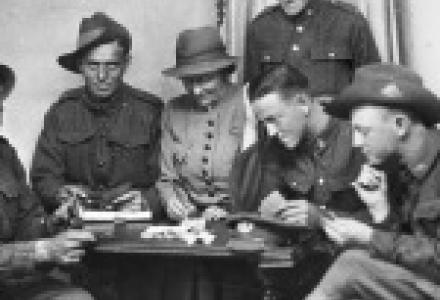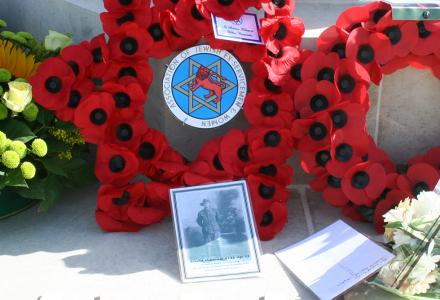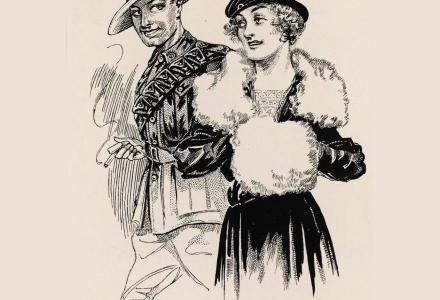Stories
Private Peter Rados was one of the first men to enlist and one of the first to vanish on Gallipoli. His body was not recovered until long after the war. Peter Rados almost certainly died a prisoner of the Turks within a few weeks of the Landing. In June 1915, a letter bearing that sad (and inconclusive) news was sent to his parents. It never reached his family. The letter was returned to AIF Headquarters in London sometime later—‘Not Known’ was printed on the envelope.
There was nothing so unusual in that. In a society where many travelled in search of work some next-of-kin proved difficult to find. On some occasions the news of the death of a loved one was relayed from one forwarding address to another. Parents sometimes chanced across their son’s name in a casualty list published by the major dailies long before they heard anything from the authorities. We can only imagine their horror as that print stared back from a morning paper.
But the route this particular letter had travelled was even more circuitous. News of Peter Rados’ death travelled by telex or ship from Gallipoli, to Egypt, on to Britain, then back to the Mediterranean. Private Rados, it appears, had changed his identity to serve with Australian Forces. His real name was Santelis Pannagioty, a Greek veteran of the Balkan Wars, sporting a scar on his chest, but keen to fight a second time against Turkey. And his mother, father, and four sisters lived not in Athens—as his recruitment papers claimed—but in Smyrna on the Aegean coast of Turkey.
Private Rados also had a brother. Like Peter, Nick Rados had emigrated from Greece, both men had adopted the same anglicised surname, both crossed the ocean to build new lives for themselves. As late as 1918, Nick knew nothing of his brother’s fate. Just a few weeks before the war ended, he wrote to the Red Cross from Atlanta, New Jersey: ‘My brother … has not been heard of since he enlisted at Sidney (sic) Australia during the early part of the war. Kindly write any information you know of him. His mother and brother are very anxious [to learn] his whereabouts’.
And Nick explained why his brother had kept his identity a secret. Peter, it seems, gave his parents’ address as Athens so that it would not interfere with his enlisting: ‘his people were living under Turkish rule and [he] himself was a Turkish subject.’
Santelis Pannagioty’s parents never found out what became of their son. Both died before the war ended. As did at least three million other civilians: victims of famine, and disease; an Allied blockade that starved Turkish cities; the forced relocations of ethnic minorities; and genocide.
Private Rados was survived by four sisters, Marika aged fifteen, Atho aged thirteen, Smaro aged eleven and Georgina, the youngest, barely ten. Nick pleaded for any help Australia might offer them. His sisters were stranded in Erdik, a territory of Turkey ceded to the Allies, and he feared for their fate, as he had for that of his brother: ‘They are in very poor condition, as they have lost all during the war. You will be doing a great act of charity if you will go to their assistance ... And what the late Private P. Rados left should be given to them’.
The authorities never found Private Rados’ sisters. Nor is there any evidence they searched for them. The protocols of the day defined the next-of-kin as the eldest male relative. Four sisters, living under Turkish rule, were really of little interest to them. In 1921, Peter Rados’ personal effects were sealed in a brown paper bag and mailed off to his brother in America, along with a commemorative medallion, a letter from the King, and a sketch of the cemetery where the Greek-Australian lay buried.
Peter Rados’ story reminds us that the ‘hardships’ of the Great War were not confined to soldiers. The privations that conflict brought in its train claimed the lives of his parents, and quite probably his four young sisters. Nor did the suffering end in 1918. In 1923, Greece and Turkey agreed to population exchanges that would tear families and communities apart, depopulate towns and cities, and leave a legacy of bitterness and confusion. The world we know today was shaped by a conflict that began in the Balkans.
For full attribution of sources, suggestions for further reading and an extended version of the story itself see ‘The hardships of war: Peter Rados’ in Bruce Scates, Rebecca Wheatley and Laura James, World War One: A History in 100 Stories (Melbourne, Penguin/Viking, 2015) pp. 157-159; 358.



